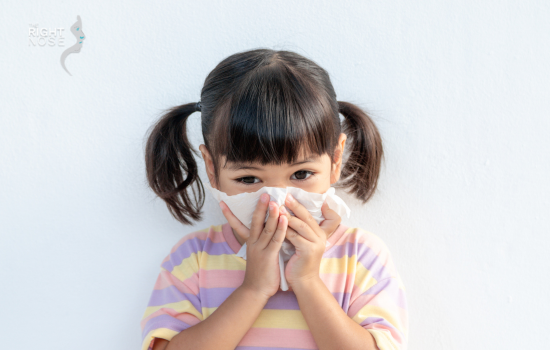How Pollution Can Affect Your Breathing and Nose Health
Ethnic Rhinoplasty: Preserving Cultural Identity While Enhancing Aesthetic Appeal
Air pollution is an unavoidable part of daily life, particularly in urban areas. While its harmful effects on lung health and cardiovascular function are well-documented, many people overlook how significantly pollution can impact their nose and overall breathing health.
From nasal blockage and congestion to chronic sinusitis and recurring infections, pollution can take a serious toll on your upper respiratory tract.
In this blog, we’ll explore how pollution affects the nose and breathing, who is most at risk, and what steps you can take to protect your respiratory health.

Understanding the Link Between Pollution and Nasal Health
Your nose serves as the body’s primary defence system against airborne pollutants. It filters out dust, allergens, harmful particles, and microbes before they can enter your lungs. However, when pollution levels rise, the nose cannot function efficiently.
Polluted air exposure can irritate the nasal lining, increase mucus production, and lead to chronic inflammation.
This can commonly result in:
- Nasal blockage or congestion
- Frequent sneezing
- Postnasal drip
- Headaches and facial pressure
- Recurring sinus infections
With time, the inflammation becomes chronic, especially in individuals who have pre-existing conditions like allergic rhinitis or asthma.
How Pollution Triggers Chronic Sinusitis
The most concerning long-term effect of pollution exposure is chronic sinusitis, a condition characterized by inflamed sinuses for more than 12 weeks. Pollutants like particulate matter (PM2.5), nitrogen dioxide, and ozone can damage the nasal and sinus tissues, disrupting the natural drainage and defence mechanisms.
Prolonged exposure to polluted air can:
- Impair the cilia (tiny hair-like structures) that help clear mucus
- Thicken mucus, making it harder to drain
- Increase the chances of bacterial and fungal growth within the sinuses
These effects create a vicious cycle of infection, congestion, and further inflammation, making chronic sinusitis difficult to manage without medical intervention.
Why You Might Sneeze or Get a Blocked Nose in Polluted Areas
Pollution can stimulate your immune system to react as if it’s encountering an allergen or irritant.
This triggers an inflammatory response in the nasal passages, characterised by swelling of the mucosal lining, increased mucus production, and the release of histamines, leading to congestion and sneezing.
Individuals suffering from hay fever or allergic rhinitis may find their symptoms worsened in areas with poor air quality.
Who Is Most at Risk?
While pollution affects everyone to some degree, certain groups are more vulnerable to pollution-related breathing and nasal problems:
- Children – Their developing respiratory systems are more sensitive to environmental irritants.
- Older adults – With age, the body’s natural defence mechanisms weaken, making recovery from sinus infections or respiratory issues slower.
- People with asthma or allergies – Their airways are already inflamed and more reactive to pollutants.
- Individuals with compromised immunity – Conditions such as diabetes or recent surgeries can lower resistance to infections.
How to Protect Your Nose and Lungs from Pollution
Pollution may be hard to avoid, but several practical steps can help reduce its impact on your breathing and nasal health:
- Practice nasal irrigation regularly using saline solution – Think of it like washing your hands if they’re dirty. Saline rinses help flush out pollutants and allergens effectively.
- Always use sterile, pre-packaged saline solutions—never tap water—to prevent infections and ensure safe irrigation.
- Monitor air quality levels—Use web–based apps to check the daily Air Quality Index (AQI) and limit outdoor exposure when levels are high.
- Wear a mask – Especially on days with high pollution, wearing a high-efficiency mask like an N95 can reduce inhalation of harmful particles.
- If you’ve stopped wearing masks, consider adding extra indoor protections like a home HEPA filter.
- Stay indoors during peak pollution hours – Typically early morning and evening.
- Focus on nasal hygiene at home – regularly clean AC vents, air filters, pillows, and bedding to minimise dust and allergens.
- Keep indoor air clean – Use air purifiers, avoid indoor smoking, and regularly ventilate your home.
- Strengthen immunity from within – A balanced diet, regular exercise, and hydration support your body’s natural defences.
When to See a Doctor
If you experience persistent symptoms despite taking preventive measures, such as chronic
nasal congestion, recurring sinus infections, or facial pressure, it may be time to consult a specialist.
Dr Levente Deak – Dubai’s Most Trusted Name in Rhinoplasty and Nasal Health
- European Board-Certified ENT Surgeon & Dual (USA, EU) Board-Certified Facial Plastic Surgeon, licensed in the UK and UAE.
- Over 15 years of international expertise treating complex nasal conditions with a unique blend of science and aesthetics.
- Trained at top global institutions in the US and Italy, with award-winning research and 15+ published papers.
- Known for precision, patient care, and consistently outstanding rhinoplasty results, backed by recommending patient reviews.
Breathe Easier—Take Control of Your Sinus Health
Pollution may be a part of modern life, but nasal discomfort and breathing issues don’t have to be. With timely medical care and the proper preventive measures, you can take care of your respiratory health and reduce the burden of pollution on your daily well-being.
Schedule your consultation with Dr Levente Deak at The Right Nose to start breathing easier today.
Some Quick FAQs
Yes. Air pollution can irritate the nasal lining, impair mucus drainage, and contribute to chronic sinusitis.
Pollutants trigger an inflammatory immune response, leading to nasal swelling, increased mucus, and sneezing.
Children, the elderly, allergy sufferers, asthmatics, and people with weak immunity are more susceptible.
Limit outdoor activity during high-pollution days, use nasal rinses, wear masks, and maintain clean indoor air.
If your symptoms persist for more than a few weeks or interfere with daily life, seek medical attention.





